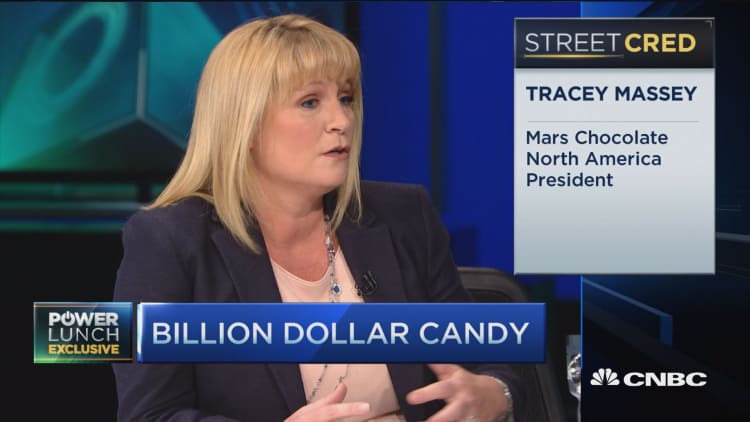
Children eat them all the time, only one in every hundred peanut gets to become one of them and it just turned 75 years old — M&M's, which were first marketed for the military, are now being marketed for millennials.
Mars Inc. told CNBC on Friday that in response to market demands, it's shifting away from it's "press shy" reputation in efforts to appeal to curious millennials.
"We have not needed to talk out before ... but we've really spoken through our brands," Tracey Massey, Mars Chocolate North America's president, said on Friday. "What's changing is consumers ... they want to know more about the companies behind the brand."
What do millennials want?
The interest in millennial consumers has grown widely recently, as many consider that the group will transform the U.S. economy. Think tank Pew Research Center reported last May that millennials had surpassed Generation X in the U.S. labor force, holding the largest share of the workforce.
In this light, investment banking company Goldman Sachs said that a strong brand is not enough to appeal to millennials. The firm argues that the generation, which prefers to consume brands that have a social presence, value price over quality; a characteristic that challenges the idea of brand loyalty.
"That is why I am here," Massey told CNBC. "So that we can start telling millennials about our business."
Inside the Mars empire
Market research firm Euromonitor International reported that two companies control most of the chocolate candy industry in the U.S.: The Hershey Co. and Mars. The privately held company was recently recently ranked the seventh-largest private company in America, according to Forbes; the firm also reports that Mars has $33 billion in sales.
Meanwhile, Euromonitor reported that last year both Mars and Hershey held a combined "value share of 64 percent across a wide portfolio of brands and categories," adding that "no other company (in NBO terms) maintains a share higher than 4 percent."
In the same vein, Massey told CNBC that M&M's is not only the company's largest brand, but also "the largest [candy] brand in the world."
The president of the Virginia-based company mentioned to "Power Lunch" that 99 percent of its U.S. sales are manufactured between 9 U.S.-based and one Canada-based factory.
"It's a big philosophy of Mars: We believe in reinvesting back in the communities that we are in," Massey said. "When we do well and we sell in America, we invest in American jobs."
What do chocolate lovers like?
Chocolate consumers are loyal to their brand of choice, something that challenges companies when introducing new products in the market, Massey noted. "Chocolate lovers, they like to try different things, but they always go back to their favorites," she said.
The expert told CNBC that in order to introduce new products, brands need to advertise the new candy for a long time before it sticks — in some cases, up to 20 years.
New marketing strategy
In its report Goldman Sachs stated that millennials eat smarter, smoke less and exercise more than previous generations.
"They're using apps to track training data, and online information to find the healthiest foods. And this is one space where they're willing to spend money on compelling brands," the firm said.
In this scenario, marketing to the health-conscious millennials may prove challenging. The health industry is constantly mulling over the the health benefits of chocolate, with some arguing in favor and others against. According to WedMD, however, the cacao-based treat could reduce heart attacks, lower blood pressure and improve arterial blood flow.
Still, much of the benefits depend on the type of chocolate consumed. While the company admits more research is needed, it said that "if the chocolate contains fat ingredients other than cocoa butter, it might contain the more harmful saturated fats and trans fats, rather than stearic acid."
As Mars brand products display nutritional information on their labels, Massey told "Power Lunch" that the company values a transparent relationship with consumers.
"What's good for business is making sure consumers know what they eat," Massey said. "One of the biggest challenges facing the food industry is over consumption of calories; fat sugar. The only way consumers can manage that is if they know what they're eating."





